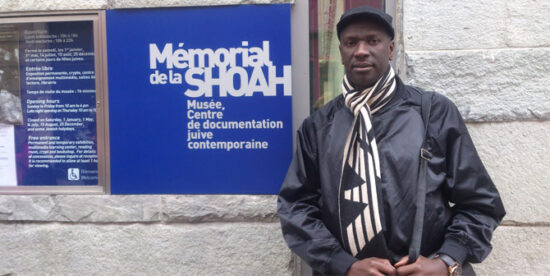
By Robert Zimmerman, Global Ties U.S.
Recent events in Paris were a poignant reminder of the consequences we face by failing to build bridges across cultures and faiths. The U.S. State Department International Visitor Leadership Program has been focused on finding ways of bringing individuals with different points of view closer together since its inception in 1940. As we mark International Holocaust Remembrance Day today, we reflect on the outstanding work of Adabacar Laye Basse of Senegal, who visited the United States in 2012 under the auspices of the program. Adabacar is a professor of Arabic at a private Catholic school in his country’s capital, Dakar. At the time of his visit to our country, sixty of his students were of Arab origin and 90 percent were Muslim. Adabacar worked with officials at the Washington, D.C. Holocaust Museum during his visit here in 2012, to pursue his interest in creating an interfaith coalition in his native country.
Adabacar visited the Holocaust Museum on account of his strong interest in the Trans-Atlantic slave trade, and the historical role Dakar played in that nefarious activity. He told his American interlocutors how profoundly he was moved by what he saw at the Holocaust Museum – and decided to do something about it. Adabacar organized an interreligious dialogue upon his return to Senegal, to include members of the country’s majority Moslem community; Christians; and representatives of Dakar’s small Jewish minority. Working with the local Cheikh Atob University, this voice of tolerance organizes a remembrance event in his country every January. Adabacar tells us this activity is possible solely because he took part in the International Visitor Leadership Program.
Adabacar lectures widely in Senegal and continues to work with the Holocaust Museum. Nevertheless, he isn’t confining his activities to Senegal’s borders. Adabacar enjoys direct contact with Holocaust educators in Morocco, Tunisia, Turkey, and India, whom he has met abroad following his return from the United States. His success has induced the Holocaust Museum to bring teams of officials from several foreign ministries of education to collaborate on projects that address how the Holocaust has been taught in their respective countries. For his part, Adabacar is pleased to have been enriched by the International Visitor Leadership Program. Thanks to his meetings at the Holocaust Museum, he believes he has the tools to popularize the principles of peace and the prevention of genocide.
